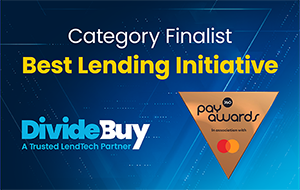‘Cost of living crisis’ is more than just the latest buzz phrase. It’s a tangible issue, made real by climbing prices and plummeting public funds.
With even higher earners feeling the pinch, consumer appetite for credit is skyrocketing. Recent Bank of England stats show that individuals borrowed an additional £1.3 billion in consumer credit in March 2022 – up from the £1 billion 12-month pre-pandemic average in February 2020.
What is consumer finance?
In a nutshell: consumer finance is a payment option, where a customer can choose to spread the cost of their purchase in a series of smaller instalments. Depending on the lender, this can be either interest free – meaning the buyer only pays the sale price of the purchase – or interest-bearing. If it’s the latter, the buyer also pays an additional percentage of the sale price, which is added to their instalment plan.
Although consumer borrowing fell by 12% during the 2020-2021 pandemic years, it’s now predicted to reach a five-year high. New business through consumer finance also grew by 20% in May 2022. Retailers are embracing this solution to attract new buyers – or even just help existing client base to weather the current crisis.
What are the benefits of offering consumer finance in 2022?
1. Take your business further, faster
Stronger Bones MD Lawrie Jones says offering multiple payment options is helping boost company growth.
“As a start-up, we’re attempting to scale,” He explains “and offering our customers a variety of options to pay for products is part of our strategy. Currently, we’re managing cash flow as we grow, and using the capital to restock our supplies and refine our processes. But in the future, we fully expect to offer customers credit options.”
2. Stay one step ahead
If a customer can buy the same item from you and your competitor at a similar price, which one are they going to choose? The answer is probably whichever retailer offers affordable finance plans. This is especially relevant if your product or service isn’t considered a necessity when it comes to household budget cuts.
“As a supplier of supplements, we know people will continue to invest in their health, but the situation can quickly change.” Lawrie acknowledges, “In a market where margins are tight, we must keep costs as low as we can. However, to stay relevant, we’ll offer finance in the future to give everyone the chance to enjoy our products.”
3. Increase conversions
Potential customers are much more likely to proceed to checkout if they’ve spotted a finance option while eyeing up your product. And if your chosen finance provider is extra accommodating – for example, by offering Soft Search pre-approval, or Try and Buy options – your conversion rate is going up.
Nick Whitemore is MD at cosmetics brand NDistribution. For Nick, offering finance options has meant customers are putting more in their baskets.
“We believe giving people flexibility in the way they pay is important,” He states, “especially if someone’s buying 10 items and only intends to keep 1 or 2. Our customers can return any items they’re not keeping before the first finance payment is due – meaning they only pay for what they’re actually going to use.”
What is ethical lending – and how does it tie in with consumer finance?
A recent Guardian article found a whopping one-third of BNPL credit users are now finding loan repayments ‘unmanageable’ – largely due to the cost of living crisis. Retailers are keen to support new and existing buyers by offering finance. But really, no one wants to put their customers in debt.
“We would not, under any circumstances, want our customers to fall into debt they cannot repay when purchasing from us.” Says Nick, “Faced with that choice or not making the sale in the first place, we’d rather not make the sale.”
Like many other business owners, Lawrie agrees with Nick. “I think customers are worried that they can over-extend themselves and struggle to repay the finance.” Lawrie notes that he would avoid finance providers who put profit over people. “As an ethical business with a commitment to helping people live better, we wouldn’t want to be associated with those who lend recklessly at high rates.”
Ethical lending means credit providers must make decisions based on affordability and financial health. It also means they must operate fairly, transparently and with empathy. Long-term loans (like mortgages) are heavily regulated to ensure the customer is only borrowing what they can reasonable afford to repay. And if circumstances change, the lender must try to reach a solution with the customer that doesn’t put them into hardship.
But can the same be said for interest free finance?
How can consumer finance providers practice ethical lending?
“To us,” Says Lawrie, “ethical lending is about providing an opportunity for customers to access credit, but without the punishing interest rates that give many credit providers a bad name.”
Up till now, interest free Buy Now Pay Later credit hasn’t fallen under regulation guidelines in the UK. This gave lenders a lot of scope to offer large amounts of money to customers who might otherwise have failed affordability checks. But in 2021, the UK government announced that the FCA (Financial Conduct Authority) would be moving to regulate interest free finance plans.
Plans for regulation are still underway, but this is good news for retailers and consumers. In the meantime, those wanting to offer consumer finance should look for lenders already abiding by FCA guidelines.
Here’s what to look for in a POS finance lender:
5 key pillars of ethical lending
1. Affordability
Make sure your lender is performing thorough checks to ensure customers can comfortably afford instalments. This is as much for their security as your own.
“Customers need to assess whether they can afford credit agreements,” Lawrie states, “and lenders must assure the provider that they can. On low-cost supplies such as supplements, the risk is low but even a few customers who fail to pay could affect our turnover and make the difference between profit and loss.”
For Nick, robust affordability measures and ethical lending go hand-in-hand. “Ethical lending means lending money to people who can afford to repay it within the terms stipulated.”
Note: At DivideBuy, we handle all affordability checks in-house to ensure they are performed to FCA standards, as well our own. Our retailers know they can trust us to only approve customers who we believe can comfortably afford the instalments.
2. Transparency
Ethical lenders should be upfront about the terms and conditions of their credit plans to the consumer – as well as their agreement with you, the retailer.
“As a retailer, we need capital to buy new products and to invest in growth.” Says Lawrie, “There are concerns that we won’t get all the money we need upfront. There are also concerns about the amount a credit provider would take from each transaction.” A good lender should be able to offer you clear and simple guidance on both these points.
By the same token, Lawrie says sellers should be transparent with their customers. “Retailers must be responsible and clear in their pricing, the length of agreements and the total cost of ownership. The impact of failing to pay must be made clear too, as it can have a dramatic and lasting impact on a person’s ability to get credit in the future.”
Note: Hidden fees, while all too common in the lending space, are a major cause of hardship. At DivideBuy, we ensure that we operate above-board, before entering into any agreements. And as for late fees – we don’t charge any.
3. Security
Identity theft and data breaches are becoming more prevalent. The FCA has a wide range of GDPR and safeguarding measures for companies in the payments industry to follow. And yet so many of us are still bombarded with unwanted marketing emails, calls and letters.
“Customers, particularly new ones for us, may be concerned about the security of their data working with a start-up.” Lawrie explains, “We need to build their trust in our businesses, processes and protection.”
A good lender will have concrete policies in place to keep you and your customers’ details secure.
Note: At DivideBuy, our Risk and Compliance team stay one step ahead of GDPR and data security. We also ensure that any sensitive information you give us is communicated through only the most secure channels.
4. Support
Whether it’s help with the onboarding and integration process for retailers, or assisting a customer with payment issues, lenders need to be available.
“From a customer’s viewpoint,” Says Nick, “the concerns we’ve heard are around manageable repayments, as well as being able to contact the lender in the event they needed to speak with them.” Nick values finance providers who make it easy for customers – and retailers – to get in touch with them when necessary.
Note: DivideBuy’s Onboarding, Retailer and Customer Success teams are UK-based and available 7 days a week. We handle each query in a timely, efficient and empathetic manner, and our Trustpilot scores reflect our dedication to five-star service.
5. Integrity
Debt charity StepChange recently voiced concerns over the estimated 30% of Britons using consumer finance options – especially as one third (31%) of credit users say that ‘lending got them into problem debt’.
CEO of DivideBuy Rob Flowers says ethical lending is embedded in the company’s policies. ‘Unlike other POS finance providers,’ Rob states, ‘our business model is not based on charging consumers late payment fees. Instead, we help consumers make informed purchasing decisions based on affordability, by offering instalment repayments over longer periods, deposit weightings and payment holidays where needed.’
For Rob, working together with the customer to find solutions if circumstances change is important. But preventing them from encountering financial hardship in the first place is even better practice.
‘Our entire ethos is about empowering consumers with flexible buying power,’ He says, ‘We look at the individual’s past and present circumstances to gain the clearest possible picture of their financial health before offering any credit.’
Note: DivideBuy’s thorough affordability checks and highly efficient automated underwriting process means that we have a delinquency rate under 3% – which is far lower than competitors.
In Conclusion:
When done responsibly, offering consumer finance options can open up a whole new customer base. It can also boost recurring revenue from existing customers – and turn more browsers into buyers. Want more info? Why not a book a demo with our team and join the hundreds of UK retailers taking their businesses further, faster with DivideBuy?




 Tweet
Tweet
 Facebook
Facebook


















